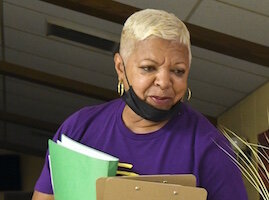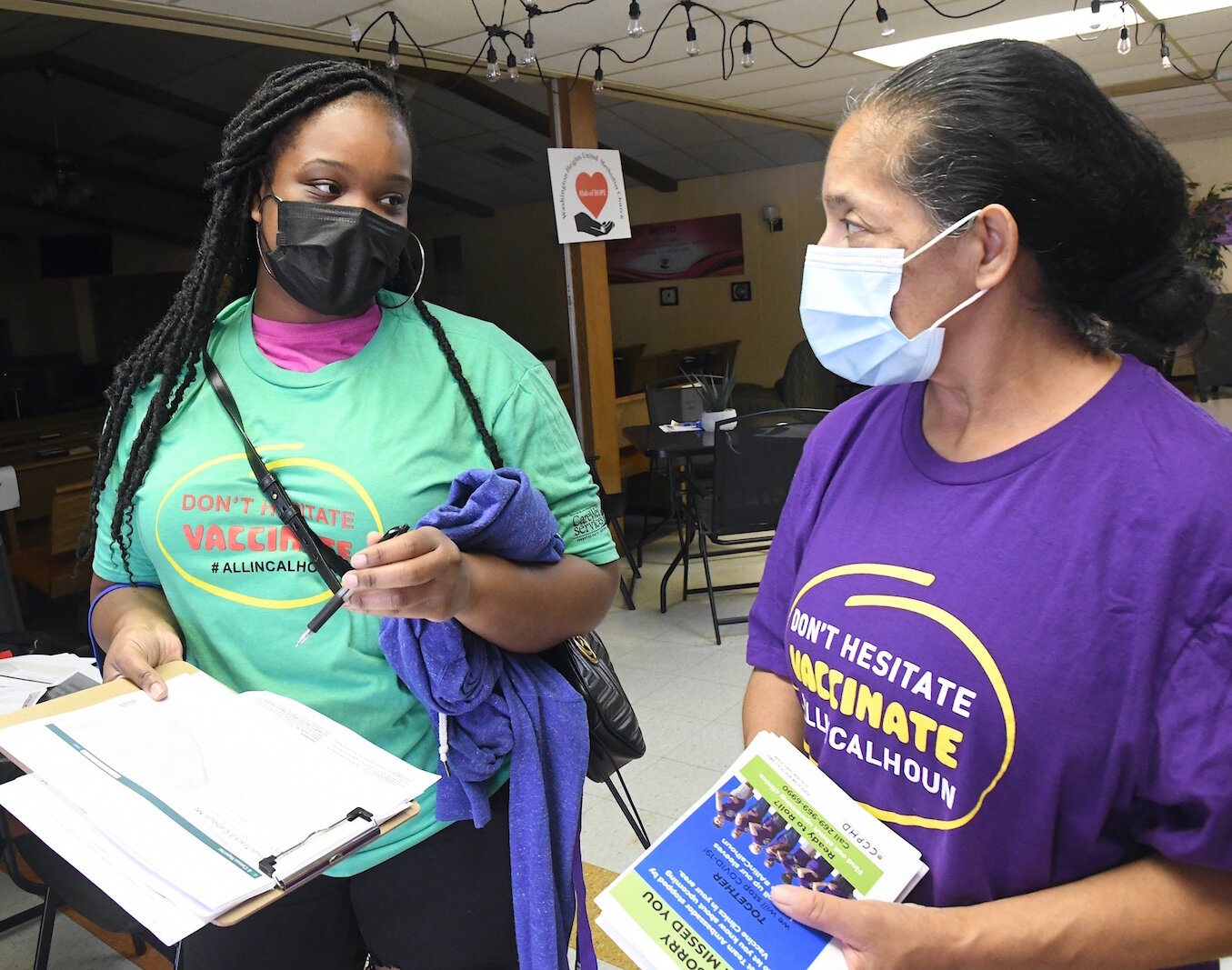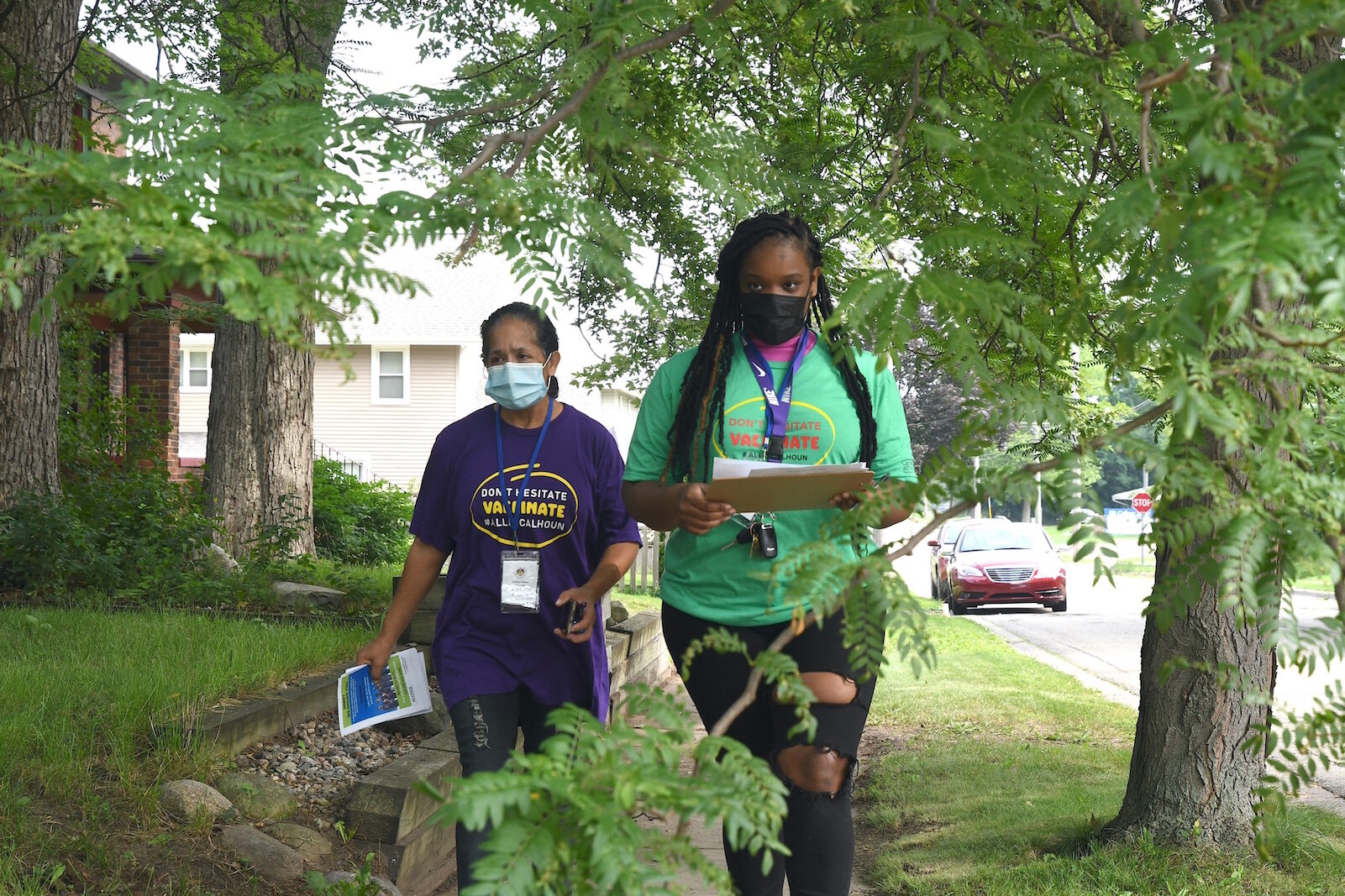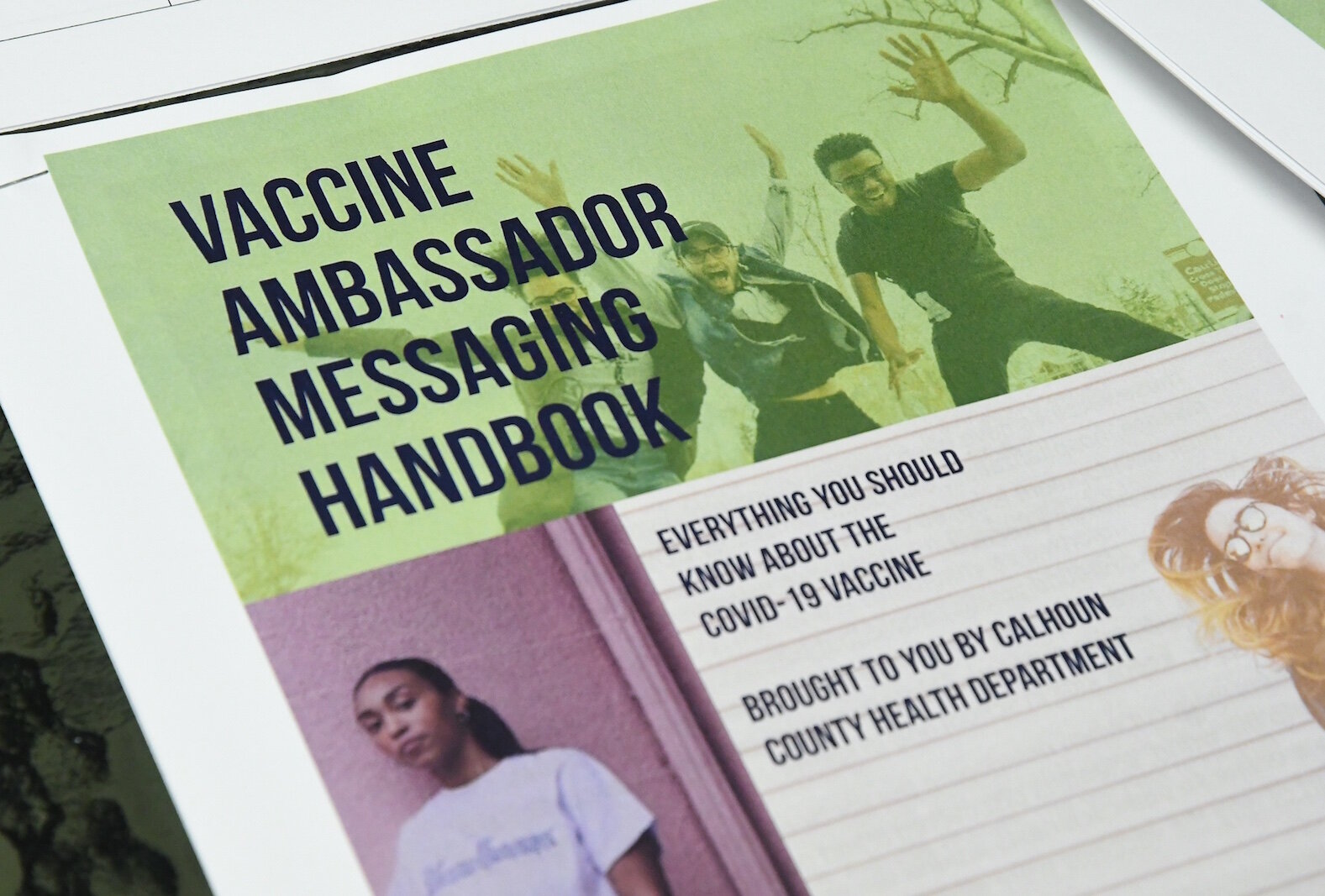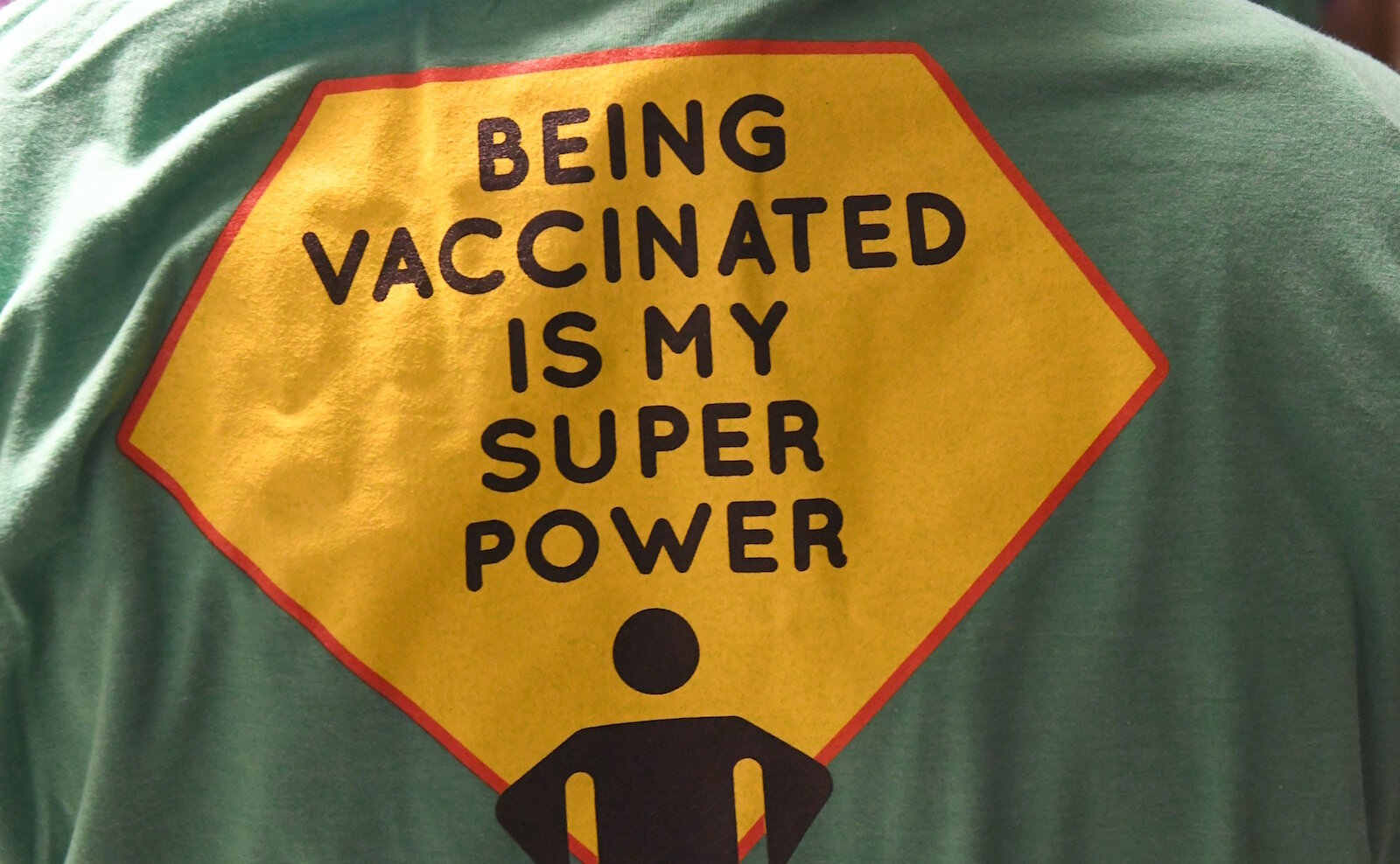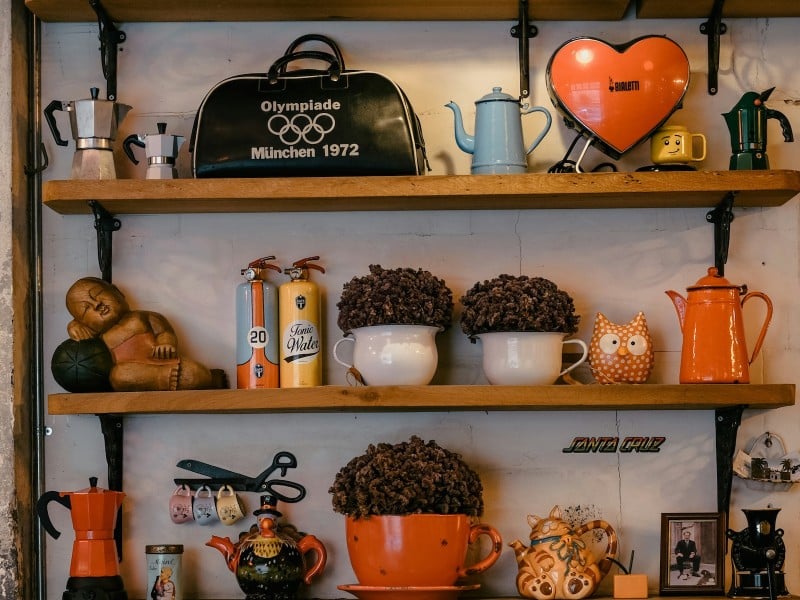Vaccine Ambassadors are playing a critical role in the effort to increase the number of those who have received protection against COVID.
Editor’s note: This story is part of Southwest Michigan Second Wave’s On the Ground Calhoun County series.
A T-shirt she wore defending the importance of getting the COVID-19 vaccine did not protect Karla Fales from negative comments coming from people she didn’t know.
Fales, Chief Executive Officer of CareWell Services Southwest, was among a group of volunteer COVID Vaccine Ambassadors who agreed to wear purple T-shirts emblazoned with the words “Don’t Hesitate Vaccinate” #AllInCalhoun” as part of a low-key, no-pressure approach to spread the word, not the virus. Some of the more than 50 ambassadors were asked to participate because they are recognized leaders in the community who have established levels of trust and credibility with residents.
Fales would discover that her designation as a “trust agent” would not resonate with everyone she encountered while wearing that T-shirt.
“Some of the questions I got were around how did I know the vaccine works and wasn’t the development of the vaccine rushed,” she says. “I’ve had a couple of situations at the grocery store when I’ve been wearing the shirt where people have called me names that I’m not going to repeat and said I was crazy and I was trying to kill people. I exited the area very quickly.”
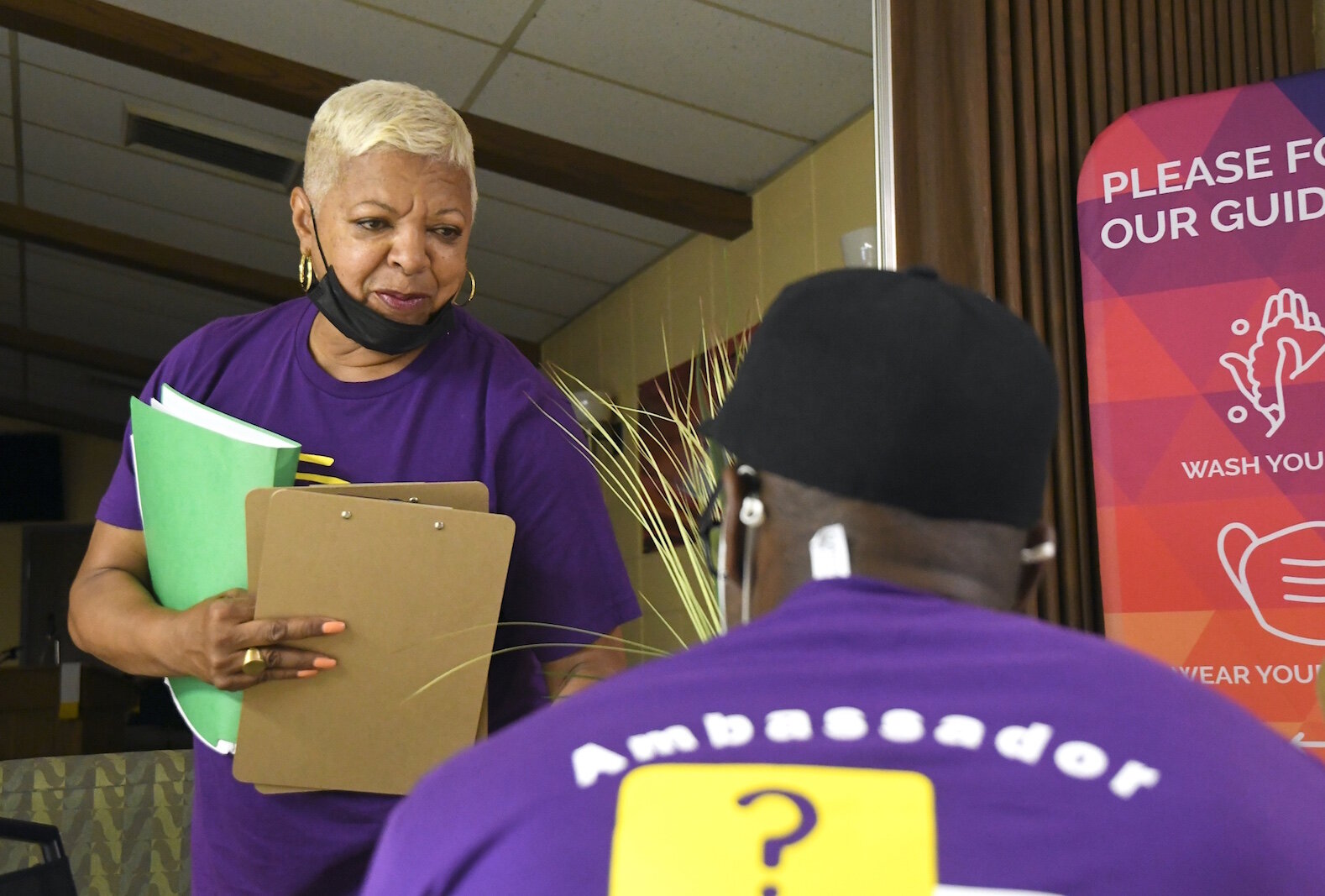
Charlie Fulbright, immediate past president of BC Pride who also agreed to wear the T-shirt, says he was spared the verbal assaults, but still found himself correcting misperceptions and inaccurate information he was hearing from people who engaged with him.
“Actually, the biggest misconception when I talk to people is that I have to tell them that I don’t have a chip in my arm now or that something drastic is going to happen,” Fulbright says. “I tell them that I am completely healthy and I have not been sick or had any adverse effects from the vaccine and I can live my life being even more comfortable with my surroundings because I have been vaccinated.”
Fulbright says he wears the T-shirt and agreed to have his likeness on area billboards because “I wanted my community to know that even being gay and a person of color I got the vaccine, both doses, and I didn’t grow a tail and nothing bad happened. COVID affects us all. It’s not specific to any groups, marginalized or otherwise. Getting that word out there is a step forward for the community.”
The information campaign is managed by the Population Health Alliance.
The PHA and the Albion Community Foundation each have received $75,000 from the Protect Michigan Commission to support efforts to communicate the most accurate and up-to-date information about the vaccine to residents. This is the Protect Michigan Commission’s overarching goal, says Fales who was appointed to the PMC by Gov. Gretchen Whitmer.
When discussion about a street team approach began among Protect Michigan Commission members, Fales was able to highlight the existing COVID Ambassadors program and the tools and resources already in place. She says the training used for the local Vaccine Ambassador program has served as a model for her PMC colleagues.
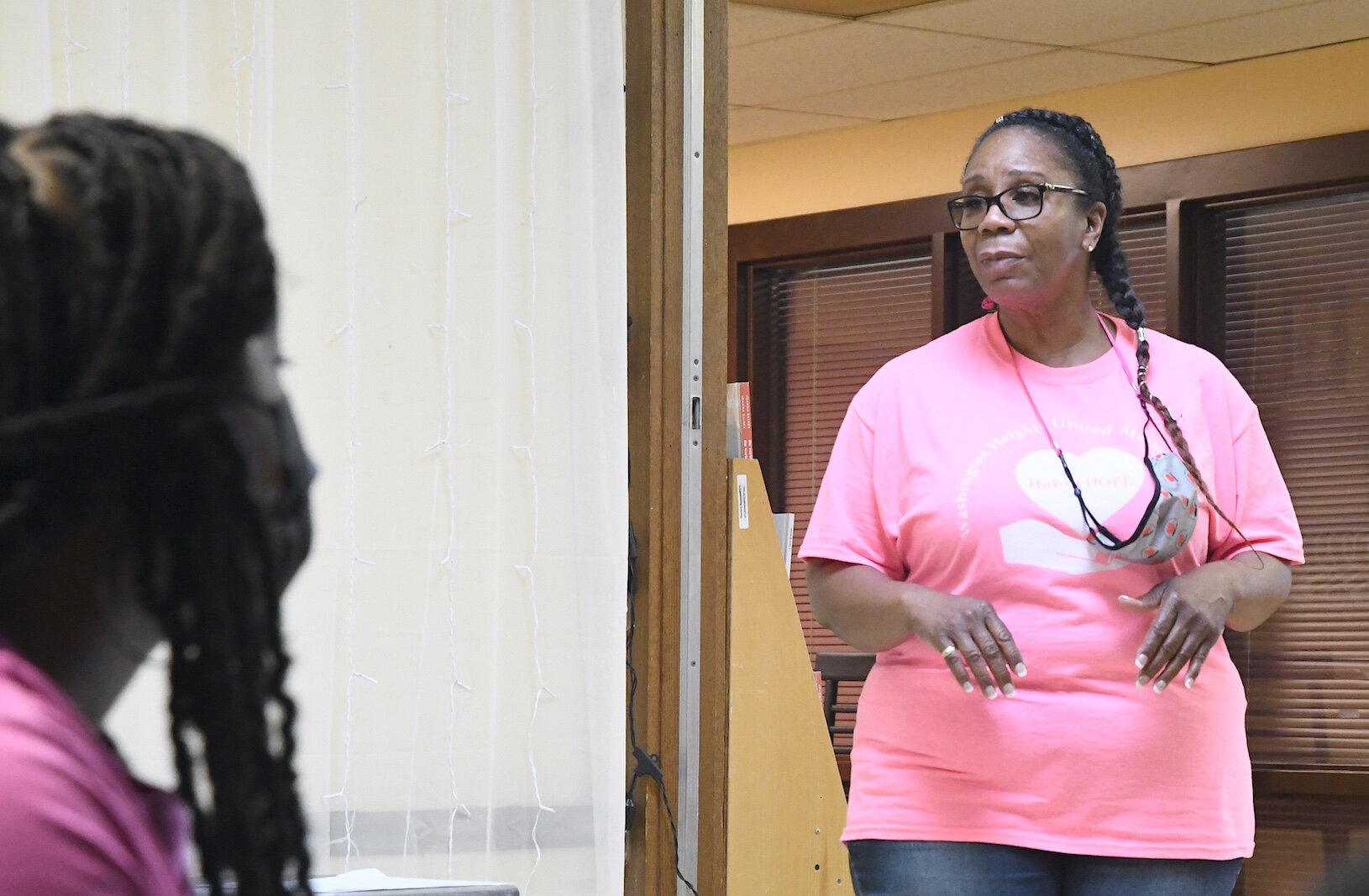
The program was initially funded in January with a $70,000 grant from Community Partners through Bronson Battle Creek Hospital to support education around COVID for people ages 18-35 and Communities of Color because infection rates among these groups have been consistently higher than other groups, according to Angela Stewart, Director of the Population Health Alliance of Calhoun County. She says the messaging initially was centered around the importance of safe practices such as social distancing and wearing a mask prior to the availability of a vaccine. The discussion now is focused on disseminating information to lessen the instances of vaccine hesitancy.
“Our materials have been shared with workgroups supporting the commission. My role really has been to carry the Calhoun County banner within those workgroups,” Fales says. “We were already doing the street teamwork and I said, ‘Let me make the connections.”
The result is what Fales calls “a phenomenal collaborative like none I have ever seen. The power of relationships is what has made it happen for us in Calhoun County. It was everyone saying I can do this part of it. It’s been the most powerful experience of my life. There were no silos whatsoever, which is how we were able to come together so quickly.”
Taking it to the Streets
The Protect Michigan Commission funds are being used to pay individuals in Battle Creek and Albion to be COVID Vaccine Ambassadors in their communities. They will be paid $15 an hour to go door-to-door in Census tracts that represent socially vulnerable communities that also are primarily Communities of Color, Stewart says.
Some of the ambassadors in the earlier stage of the program received a stipend or received gift cards, however, the Protect Michigan Commission funds will enable the program to increase the number of people who will take the message about the vaccine to the streets as they meet people where they are.
Like the initial group of ambassadors, these ambassadors must go through a training led by Dr. William Nettleton, an Assistant Professor in WMed’s Department of Family and Community Medicine and Medical Director of Kalamazoo County Health and Community Services Department and Calhoun County Public Health Department. They will wear the T-shirts and badges provided by the Calhoun County Department of Public Health identifying them as official ambassadors.
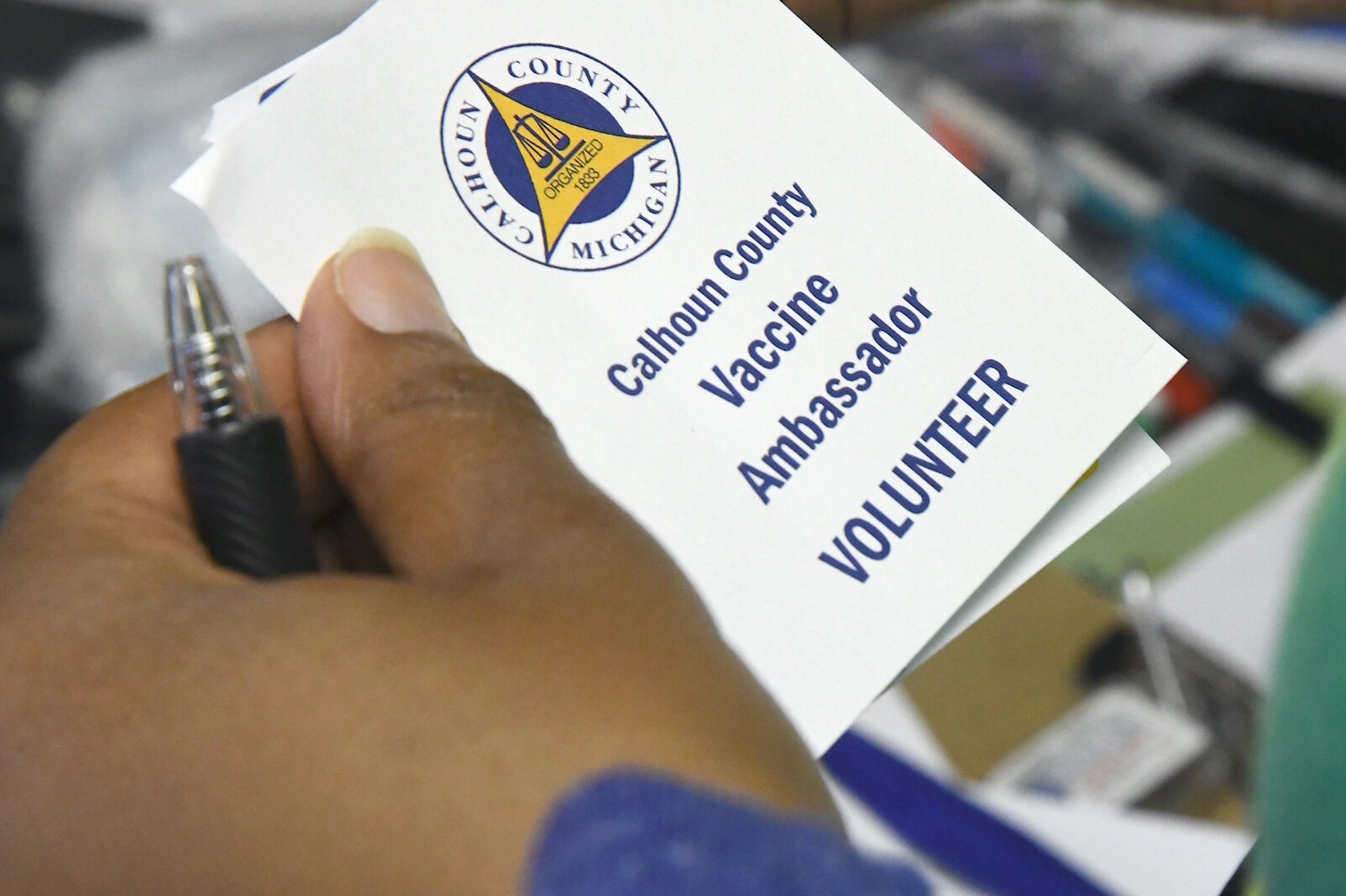
“We will start with the Census tracts and go a little bit broader,” Stewart says. “We’ll have between 10 to 15 ambassadors each in Albion and Battle Creek going out at a time. You’ll most likely see ambassadors out every day for the next 8 to 10 weeks. They’ll be wearing masks and carry hand sanitizer to take care of their health and well-being.”
The work in Albion is being managed by the Albion Health Care Alliance and paid ambassadors there have already been out knocking on doors and talking with residents.
Residents 65 years and older who have had both doses are at 72.8 percent. Residents between ages 12 and 64 are at 38.7 percent and those 16 and older are at 47.9 percent. Statewide, nearly 62 percent of Michiganders have been vaccinated.
Eric Pessell, Calhoun County Health Officer, says these percentages indicate that there is work to be done to encourage residents who have not yet been vaccinated to get the vaccine. He says the Vaccine Ambassadors will play a critical role in this effort.
“The Population Health Alliance’s vaccine ambassador program ensures specific audiences in Calhoun County are being reached,” Pessell says. “Our ambassadors go through a video vaccine outreach training that is hosted by Calhoun County’s Medical Director Dr. William Nettleton, so each person is comfortable going door-to-door to answer questions residents may have about the COVID-19 vaccine.
“The ambassador program is an important piece of our outreach efforts, and the work is not over. We look forward to the ambassador program continuing and improving our vaccination rates in the community.”
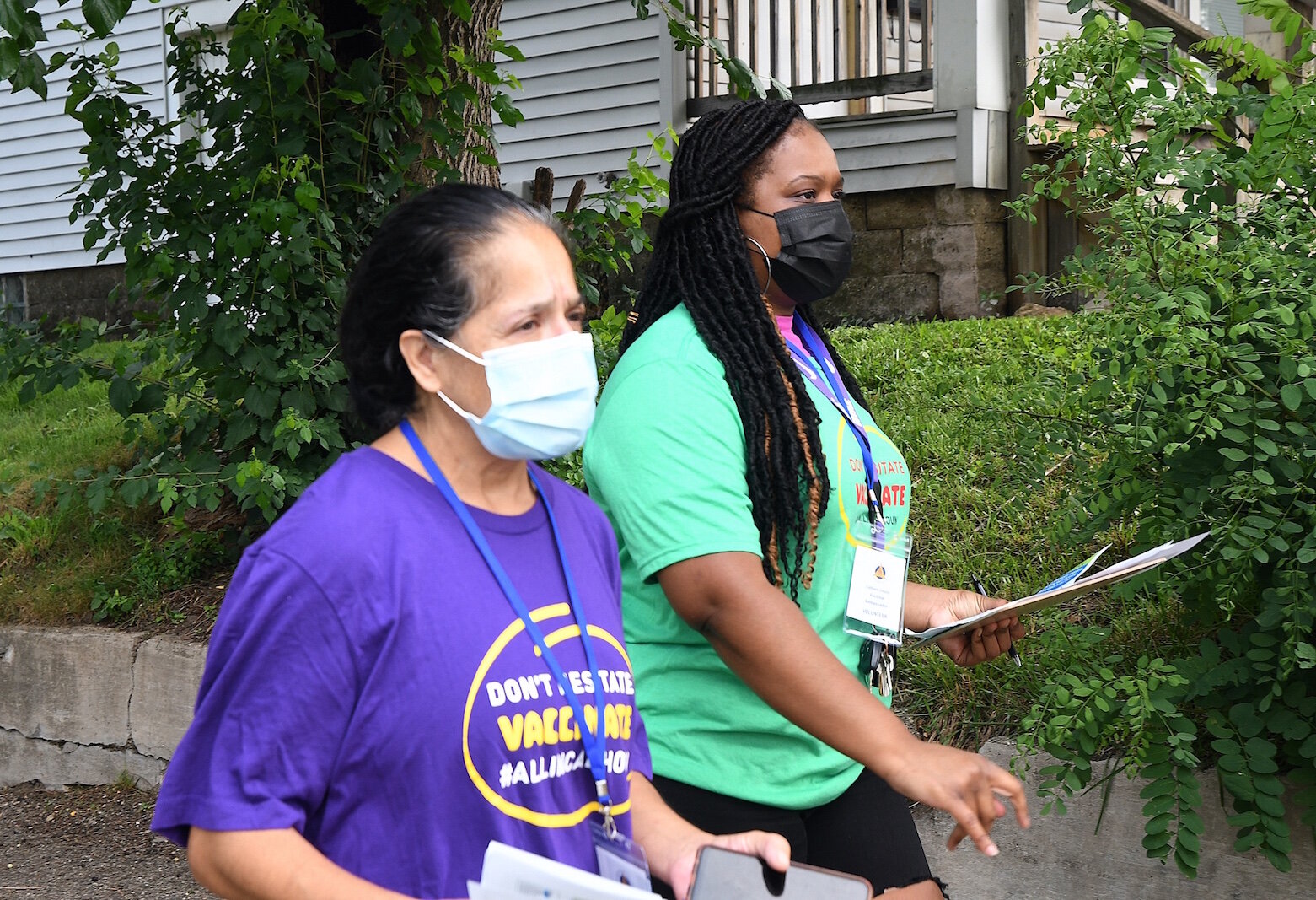
Elder Edmon Mann, co-Pastor of Faith Nation in Jackson, and his wife, Mary, live in Albion and began volunteering in June as ambassadors. Now they are being paid for this work and say they will continue to do it because they see the need to give people informed choices about the benefits of getting that vaccination.
“Some of the responses we’ve gotten were ‘Thank you, but we’ve already received the vaccine;’ ‘We want to think about it some more before we make a decision;’ and some of the other responses were, ‘No, I’m not going to get it’ or ‘We want to see how it’s worked for other people who have gotten it,’” Mann says.
This pushback is being fueled by fear, mistrust, and the spread of inaccurate information about the vaccines.
“People who are hesitant, don’t trust the medical environment,” says Carey Whitfield, President of the Battle Creek Chapter of the NAACP (National Association for the Advancement of Colored People) and a local Realtor. “Trump followers are saying (the vaccine) is not necessary and they think it’s still a hoax and of course you’ve got people who genuinely don’t think the vaccination is for them. They want to see the results before they take the plunge.”
Fales says this vaccine hesitancy is especially evident in BIPOC (Black Indigenous People of Color) communities because of historical trauma caused through coercion into involvement in government-run programs and participation in medical experimentation programs that resulted in negative experiences and deadly consequences.
“That’s why ambassadors are so important in those communities that struggle with those uncertainties based on propaganda and politics, and just a lot of misinformation,” Fales says
Mann says that he and his wife believe that “once a person is given the information, the pros about it, then they would make their own informed decision and we just wanted people to be informed about the facts and the data of what was happening and how people who received the shot are less likely to die or be hospitalized.”
The end goal for the Albion effort is to get as many people as possible vaccinated there, says Rod Auton, Administrator for the Albion Health Care Alliance.
“We are focused on getting shots in arms,” he says. “We are trying to localize a lot of our efforts, like clinics, and make them convenient for residents. We are using ambassadors in the community and trying to personalize it that way. This is creating the ability to get as many people as possible vaccinated.”
It’s personal
The Battle Creek NAACP is one of several local organizations that agreed to recruit paid ambassadors. Whitfield asked Lorraine Hunter, a member of the NAACP who is retired from Post Consumer Brands, to lead that effort. Hunter says she is close to her goal of recruiting 16 people, most of whom already have full-time jobs and will be doing this on the side.
But that goal is not the only thing motivating her to become involved in this effort.
“I have a 53-year-old son who got sick in March with COVID,” Hunter says. “He was very ill and he was hospitalized. After he was discharged from the hospital, he had to go into a nursing home because he couldn’t walk and he had to learn how to walk again.”
Her son has since made a full recovery, but the fear and anxiety Hunter experienced as he fought the virus and its after-effects are never far from her mind. She says this is why she agreed to take on the recruitment.
“My son got sick in March. I prayed every day for my child hoping he would OK. This is personal to me because of my son,” Hunter says. “I would tell people who are hesitant about getting the vaccine that speaking from experience, you have some protection in your system with the two-shot vaccines from Pfizer and Moderna or the one-shot Johnson & Johnson vaccine. I’m not a doctor. I listen to the news and read a lot of information and I know that some protection is better than nothing.”
This is a message Whitefield says can’t be stressed enough. This past fall he was admitted to the hospital with COVID. He was hospitalized for one month and there were days, he says, when he wasn’t sure that he would live to see another day.
“I still have lung damage and I have had heart problems now, and those are the two principal things,” Whitfield says. “I still have to sleep with oxygen at night. I’m scheduled to go to the Cleveland Clinic for my pulmonary and cardiovascular issues to see if they can help me there.”
Given the health issues that Whitfield is continuing to deal with, it should come as no surprise to anyone that he steadfastly defends the importance of getting vaccinated against the virus. He does not mince words when talking about this.
“It bothers me because it’s not all about them, it’s about others as well,” he says. “You can be infecting or exposing others to this very ugly phenomenon and possibly fatalities as a result. It bothers me to know that these people feel perfectly fine walking around our community without masks and as a result, they are not thinking about other people. I know that it’s real and I know that it exists. I continue to deal with and address it every day because of the physical issues.
“I’m not complaining, I’m just happy to be here. But, I don’t understand others who are willing to subject themselves or others they may love or care for to the virus.”

